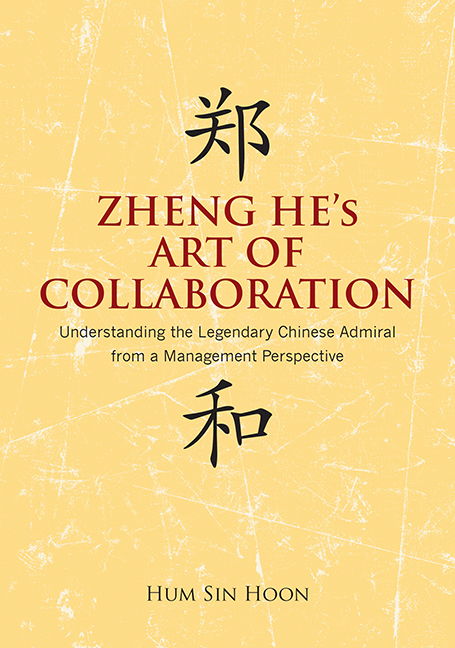 Zheng He's Art of Collaboration
Zheng He's Art of Collaboration Book contents
- Frontmatter
- Contents
- Foreword by Tan Ta Sen
- Message by Wong Ah Long
- Preface
- Acknowledgements
- PART I ZHENG HE AND HIS MESSAGE
- PART II ZHENG HE AND HIS MANAGEMENT
- Chapter 5 Learning from Zheng He
- Chapter 6 Learning from Zheng He
- Chapter 7 Learning from Zheng He
- Chapter 8 Zheng He and His Faith
- Index
- About the Author
Chapter 8 - Zheng He and His Faith
Implications for Management Practices
from PART II - ZHENG HE AND HIS MANAGEMENT
Published online by Cambridge University Press: 21 October 2015
- Frontmatter
- Contents
- Foreword by Tan Ta Sen
- Message by Wong Ah Long
- Preface
- Acknowledgements
- PART I ZHENG HE AND HIS MESSAGE
- PART II ZHENG HE AND HIS MANAGEMENT
- Chapter 5 Learning from Zheng He
- Chapter 6 Learning from Zheng He
- Chapter 7 Learning from Zheng He
- Chapter 8 Zheng He and His Faith
- Index
- About the Author
Summary
INTRODUCTION
When we explore the existing literature on Zheng He and his grand voyages, it is difficult to miss the observation that Zheng He and his men were significantly involved in praying for divine help and protection. For example, in two of the few primary sources of writing on Zheng He, namely the Liujiagang and Changle inscriptions of 1431, much space were devoted to their invocation for divine protection and honouring of the “Heavenly Princess” or Tianfei — the goddess of sailors and seafarers. In fact, Zheng He and his associates also made mention of the religious buildings they had helped in: the repair of the halls of Buddhas and the temples of the gods, including making the statue of the goddess shine as though it were new. They also stated their resolve to do even more for their gods.
To Zheng He then, his faith practices were therefore both prominent and real throughout his grand voyages. Perhaps it is not difficult for us to understand why. Once Zheng He and his men were out in the open seas, his own vulnerability to the natural elements, and that of his tens of thousands of men, became helplessly obvious. Zheng He must have realized very quickly through such a sense of leadership loneliness that he needed to invoke divine help. At the same time, throughout his grand voyages, Zheng He would have encountered rulers and peoples of various nationalities, cultures and religions. Even his own crew comprised men of different religious faith and beliefs. These would no doubt have added to Zheng He's sense of spiritual awareness, and the importance he attached to religious beliefs and practices.
In today's context, the relationship between religion and business appear to be a complex one. Any mention of the two elements together would tend to bring about a generally negative response from many. Indeed, most would think that the two should be kept separate and should never be mixed. To some extent, this is true as religion can pose real problems with regard to management of the company and its employees.3 And with today's globalization, talents and skills are mobile across borders, and this would add to the personnel diversity and hence complexity in managing a multi-religious workforce.
- Type
- Chapter
- Information
- Zheng He's Art of CollaborationUnderstanding the Legendary Chinese Admiral from a Management Perspective, pp. 248 - 272Publisher: ISEAS–Yusof Ishak InstitutePrint publication year: 2011


